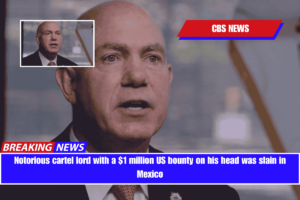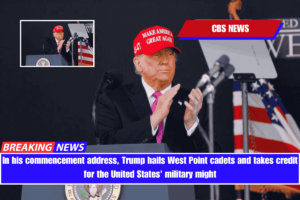Mike Waltz, national security adviser, is leaving his position at the White House, but shortly after reports of his departure surfaced, President Trump announced that he intends to nominate him as ambassador to the UN.
As of Thursday afternoon, it was unclear whether Waltz’s deputy, Alex Wong, would continue to serve on the National Security Council.
In addition, the president announced on social media that Secretary of State Marco Rubio will serve as national security adviser in the interim. Waltz’s appointment as ambassador will require Senate confirmation.
“I am pleased to announce that I will be nominating Mike Waltz to be the next United States Ambassador to the United Nations,” the president wrote on Twitter. “From his time in uniform on the battlefield, in Congress, and as my National Security Advisor, Mike Waltz has worked tirelessly to prioritize our country’s interests.
I know he’ll do the same in his new position. In the interim, Secretary of State Marco Rubio will serve as National Security Advisor while maintaining his strong leadership at the State Department.
On X, Waltz stated: “I’m deeply honored to continue my service to President Trump and our great nation.”
According to sources, Waltz’s nomination to be United Nations ambassador was made at the last minute. According to sources, Mr. Trump made the decision Thursday morning, but there had previously been discussions about moving Waltz out of the NSC.
Multiple sources told CBS News that Rubio and Waltz met on Thursday to discuss the role transition. Even some senior advisers at the State Department and the White House weren’t sure when Rubio would take over as interim national security adviser.
According to sources, Deputy Secretary of State Christopher Landau was not informed of Waltz’s departure from the NSC before it became public, and the circle of people who knew Waltz was leaving was small.
A variety of factors contributed to the change. According to sources, the White House believed Waltz did not adequately vet NSC staff, in addition to the Signal saga and a poor fit between Waltz and the senior team.
However, Mr. Trump respects Waltz, according to sources, and, unlike some figures in Mr. Trump’s first term, Waltz was not ousted without explanation. He was instead assigned a high-profile new position. Mark Halperin, a journalist, first reported the departures.
Tammy Bruce, a State Department spokesperson, learned of the president’s decision to appoint Rubio as interim national security adviser during a briefing Thursday. When asked by a reporter how long he might stay in the position, Bruce replied, “It is clear that I just heard this from you.”
Susie Wiles, the president’s chief of staff, discussed the Waltz case several times on Thursday, according to sources.
In March, Waltz faced criticism for putting together a Signal chat that included The Atlantic’s Jeffrey Goldberg, disclosing discussions with top national security officials about plans for a military strike on Houthi targets in Yemen.
Goldberg published his account, omitting operational details at first, but after Defense Secretary Pete Hegseth, Director of National Intelligence Tulsi Gabbard, and CIA Director John Ratcliffe denied any classified information had been shared on the chat, Goldberg published that information as well, including the timing of the strikes and the weapon packages used.
After Waltz admitted behind closed doors that the reporting was accurate, White House officials debated whether he should resign, but Waltz never made the offer, and Mr. Trump did not ask him to step down at the time. President Trump publicly supported Waltz, referring to him as “a good man” who “learned a lesson.”
According to a source familiar with the situation at the National Security Council, the president believes that enough time has passed since the Signal incident to justify Waltz and Wong’s departures as part of reorganization. The president had been hesitant to remove Waltz because he feared it would be interpreted as capitulating to external pressure.
Wong, contacted by phone, declined to comment.
Waltz, President Trump’s nominee for ambassador to the United Nations, will face Senate confirmation. Democratic Senator Mark Warner of Virginia praised Waltz and the Signal incident, saying he “acknowledged the huge mistake made with that very sensitive information that if it got out, we could have lost pilots.” Nonetheless, when asked by a reporter about Waltz’s Senate confirmation hearing, Warner said, “I think it would be pretty brutal.” Let us see what happens.
Republican Senator John Cornyn of Texas expressed confidence Thursday that Waltz would be confirmed, telling reporters, “I’m glad he’s still going to be part of the administration.”
In the first Trump administration, Wong was the deputy special representative for North Korea and the State Department’s deputy assistant secretary for East Asian and Pacific Affairs. In announcing his appointment, President Trump stated that Wong assisted in negotiating his summit with North Korean leader Kim Jong Un.
Steve Witkoff, the United States’ envoy to the Middle East, is unlikely to be named permanent national security adviser, according to two sources. Mr. Trump’s allies speculated on Thursday that White House deputy chief of staff Stephen Miller, or possibly deputy assistant to the president and senior director for counterterrorism Seb Gorka, could be considered because they are so committed to Mr. Trump’s mission. Ric Grenell, the special presidential envoy for special missions, stated publicly that he did not want the position.
Waltz and Wong’s departures follow the firing of at least six NSC employees in early April. Those previous firings occurred shortly after right-wing personality Laura Loomer visited the Oval Office and presented Mr. Trump with opposition research on NSC staffers whom she considers neoconservatives or not sufficiently loyal to the president, according to one source.


















Leave a Reply